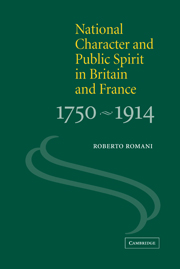Book contents
- Frontmatter
- Contents
- Acknowledgements
- List of abbreviations
- Introduction
- Part I 1750–1850
- 1 All Montesquieu's sons: the place of esprit général, caractère national, and mœurs in French political philosophy, 1748–1789
- 2 After the Revolution: Staël on political morality
- 3 From republicanism to industrialism and national character: Melchiorre Gioja, Charles Dupin, and Continental political economy, 1800–1848
- 4 The French Restoration dispute over mores and Tocqueville
- 5 Between Whiggism and the science of manners: Britain, 1750–1800
- 6 British views on Irish national character, 1800–1846
- Part II 1850–1914
- Conclusion
- Index
3 - From republicanism to industrialism and national character: Melchiorre Gioja, Charles Dupin, and Continental political economy, 1800–1848
Published online by Cambridge University Press: 22 September 2009
- Frontmatter
- Contents
- Acknowledgements
- List of abbreviations
- Introduction
- Part I 1750–1850
- 1 All Montesquieu's sons: the place of esprit général, caractère national, and mœurs in French political philosophy, 1748–1789
- 2 After the Revolution: Staël on political morality
- 3 From republicanism to industrialism and national character: Melchiorre Gioja, Charles Dupin, and Continental political economy, 1800–1848
- 4 The French Restoration dispute over mores and Tocqueville
- 5 Between Whiggism and the science of manners: Britain, 1750–1800
- 6 British views on Irish national character, 1800–1846
- Part II 1850–1914
- Conclusion
- Index
Summary
Introduction
Can two authors, unquestionably minor in many respects, be taken to represent a breakthrough in European thought? The answer is yes, if their inferior status when judged by posterity rests on a relative lack of brilliance, but contrasts with both the great esteem in which they were held by contemporaries and the wide sway they exerted. Additionally, when the scholar concentrates on the underlying structures of thought, the so-called ‘minor’ writers may prove more representative than the ‘major’ ones. In the aftermath of the French Revolution, the Italian Melchiorre Gioja (1767–1829) and the Frenchman Charles Dupin (1784–1873) provide exemplary evidence of that most un-English intellectual product, early and mid-nineteenth-century Continental political economy. The focus of the chapter is on the clues to the shift from ‘virtue’ to ‘industry’ which can be gained from the two authors. The second section is devoted to a short profile of Gioja, while the third deals with Dupin; subsequently, it will be argued that some key aspects of their approach are discernible in other Italian (section 4) and French (section 5) economists of the first half of the century. The main issues raised are reconsidered in the concluding remarks (section 6). The parallel treatment of two national cases is intended to highlight not only the similarity of responses that the demise of revolutionary Rousseauism induced, but also the differences.
The relevance of classical political economy to the subject of this book is twofold.
- Type
- Chapter
- Information
- Publisher: Cambridge University PressPrint publication year: 2001



